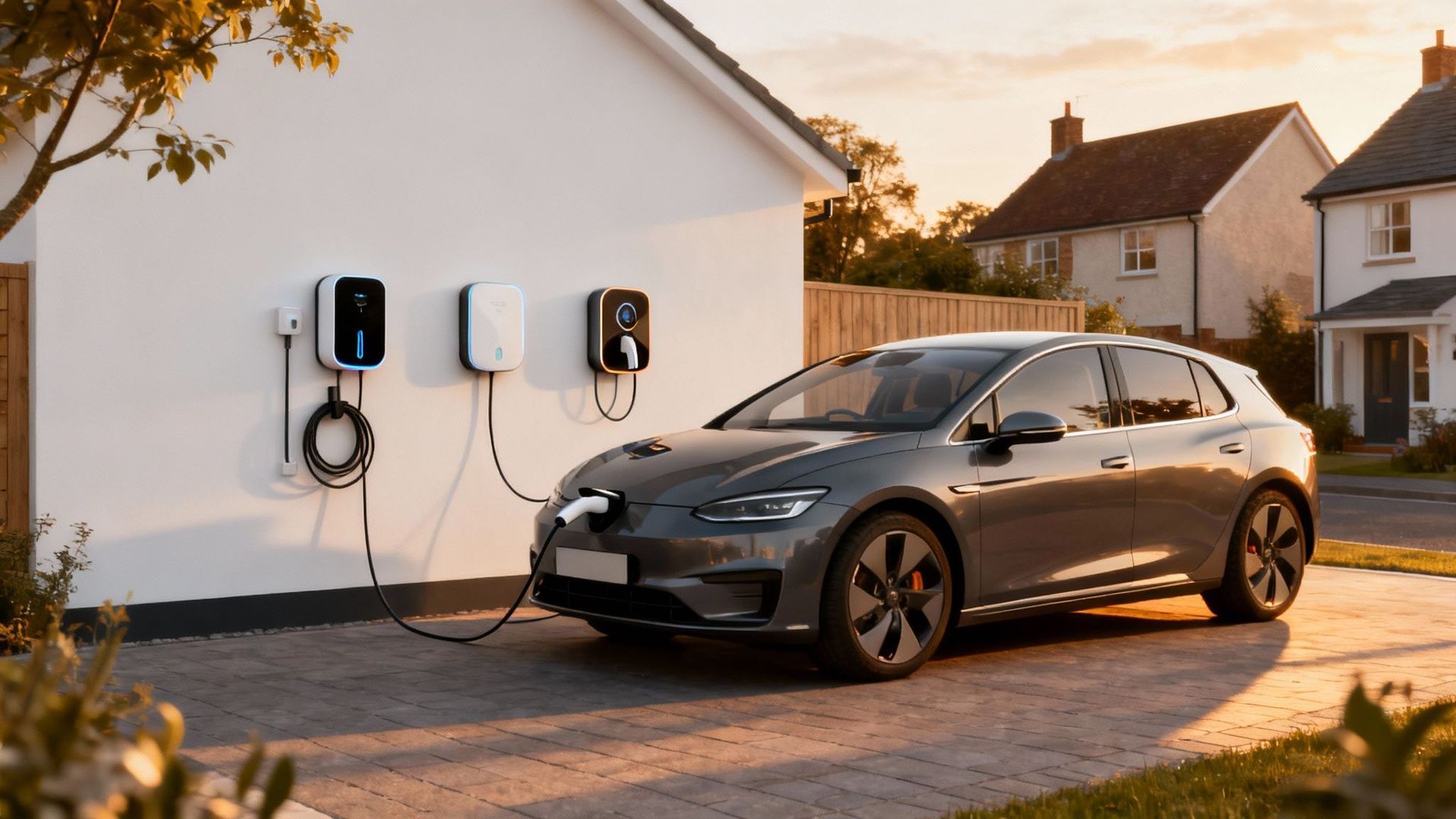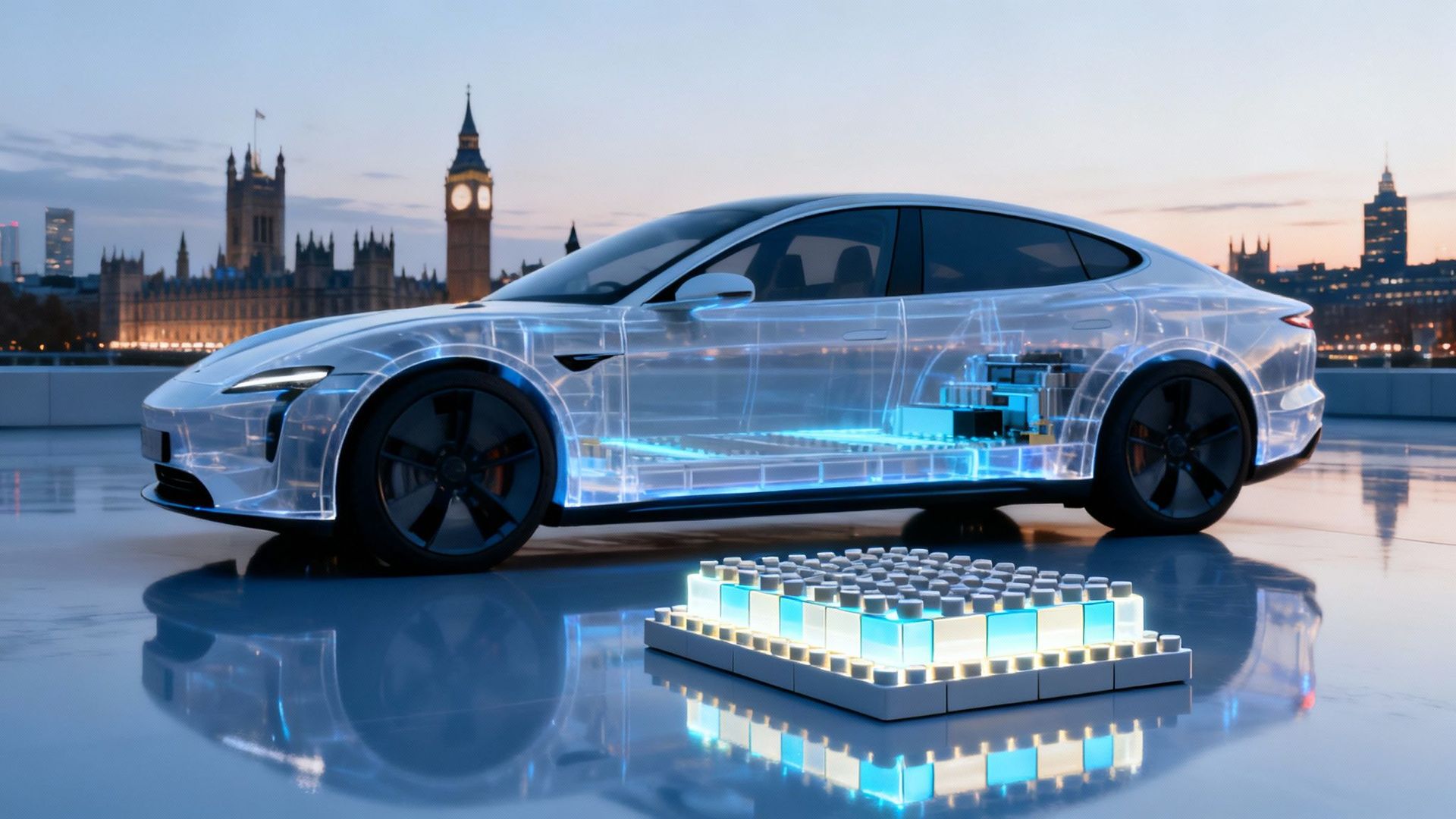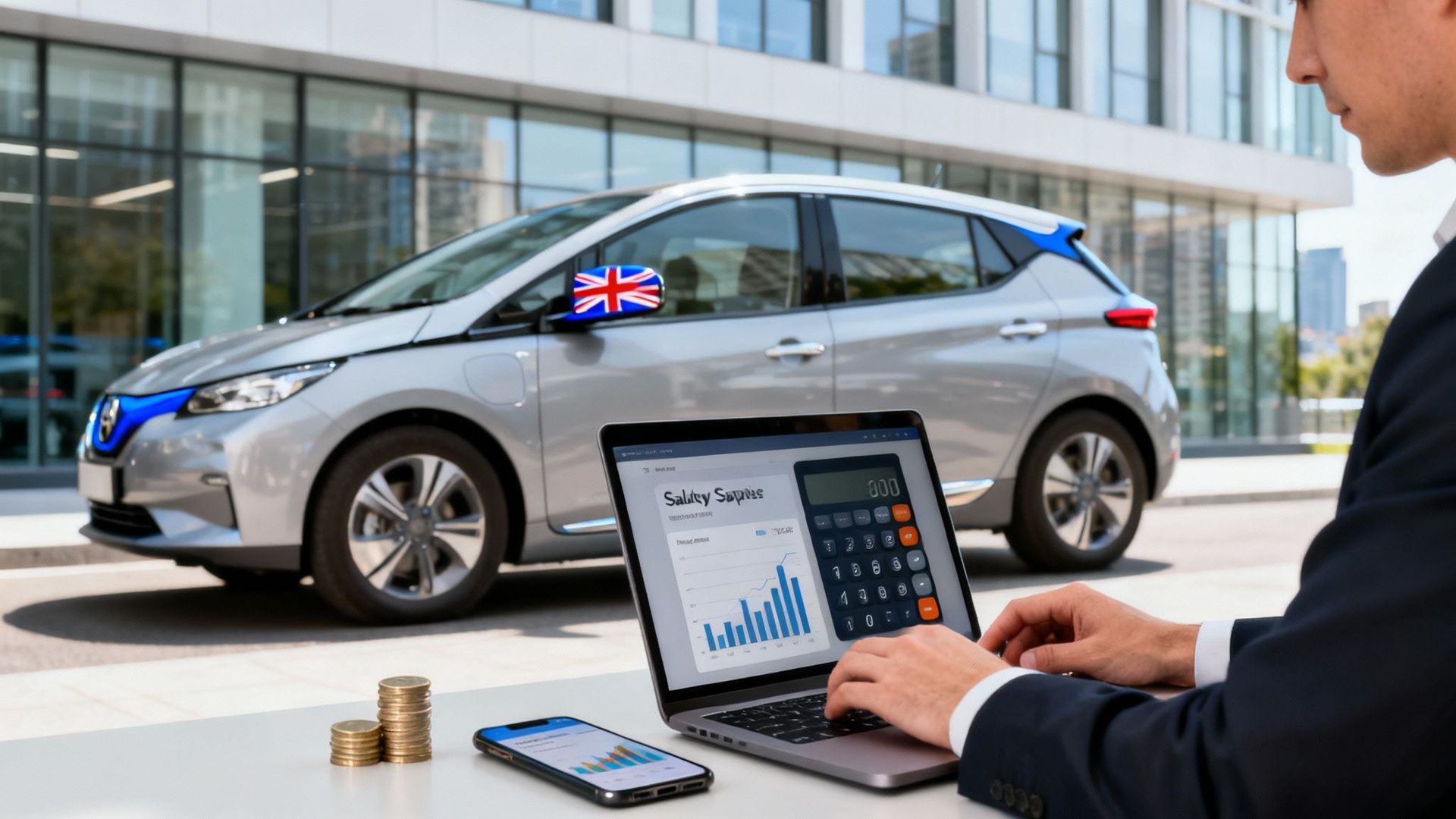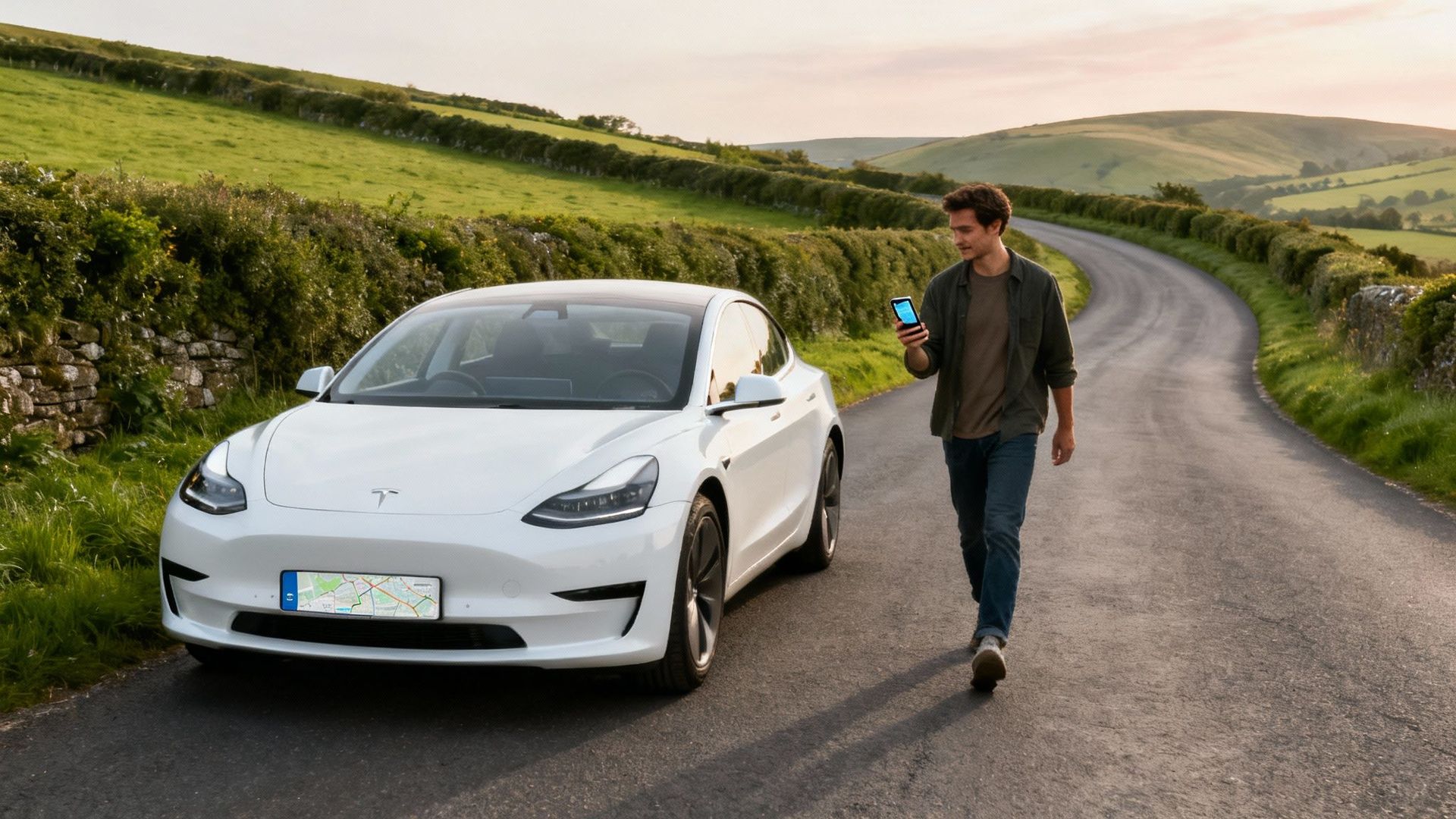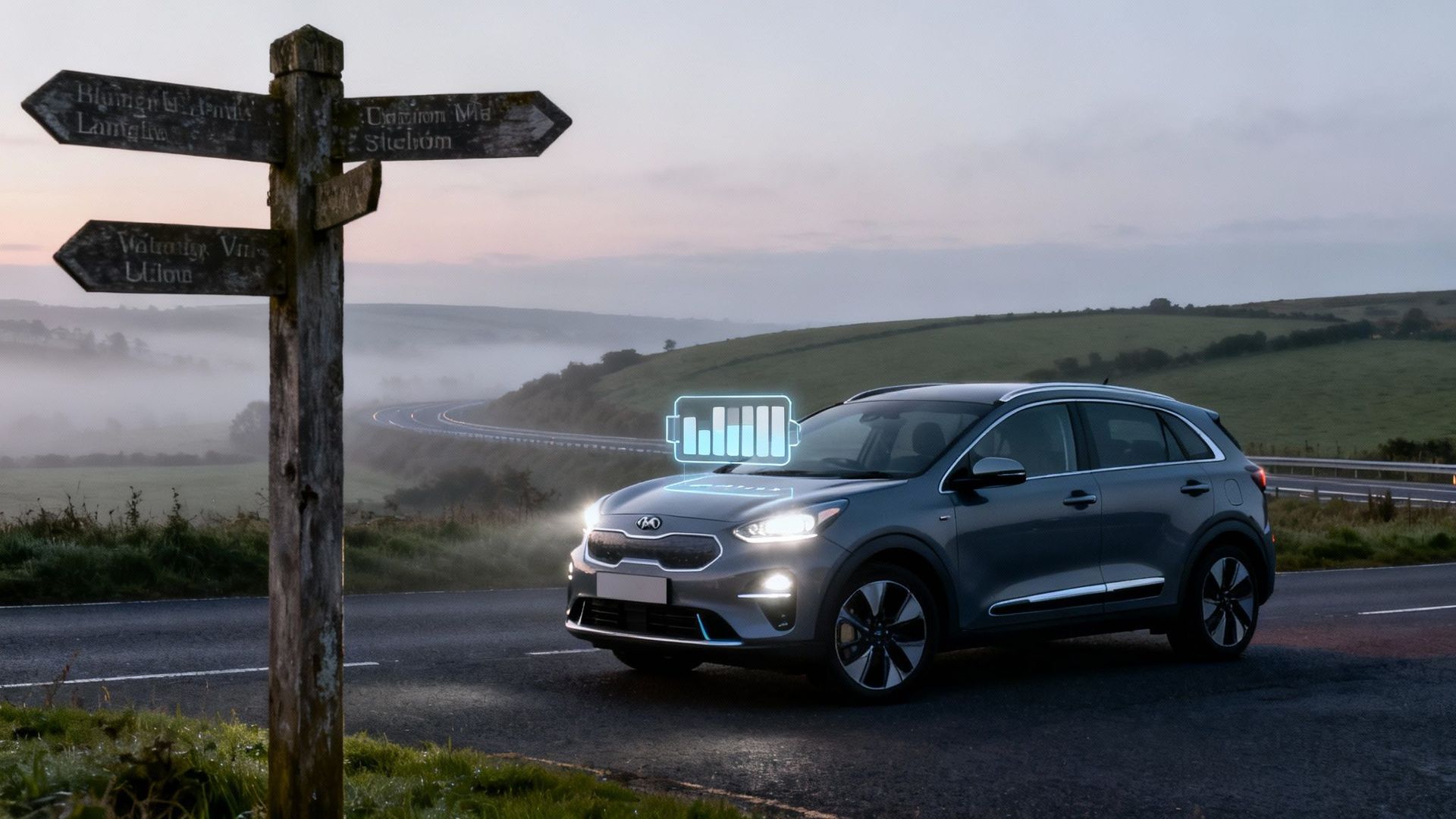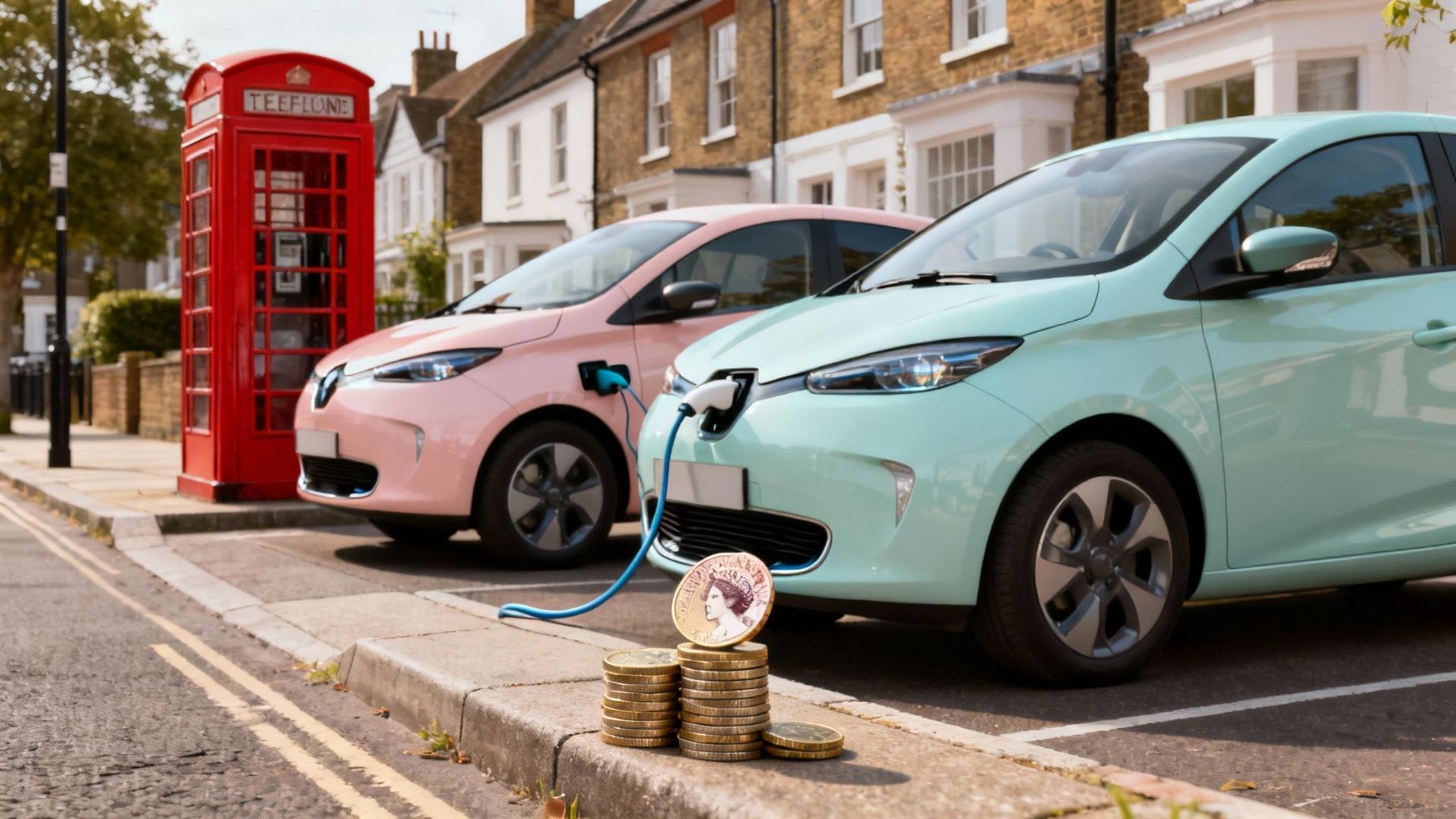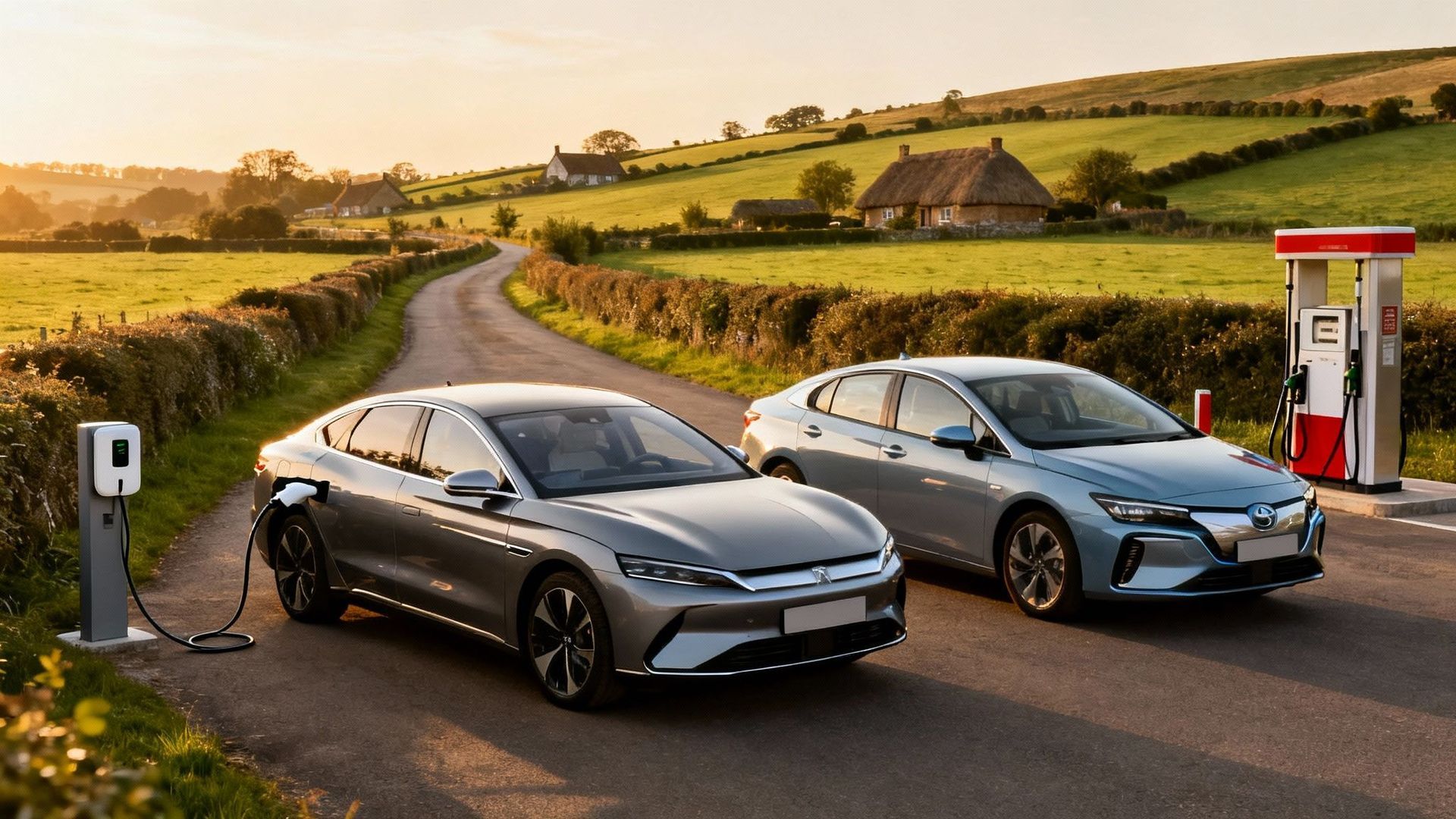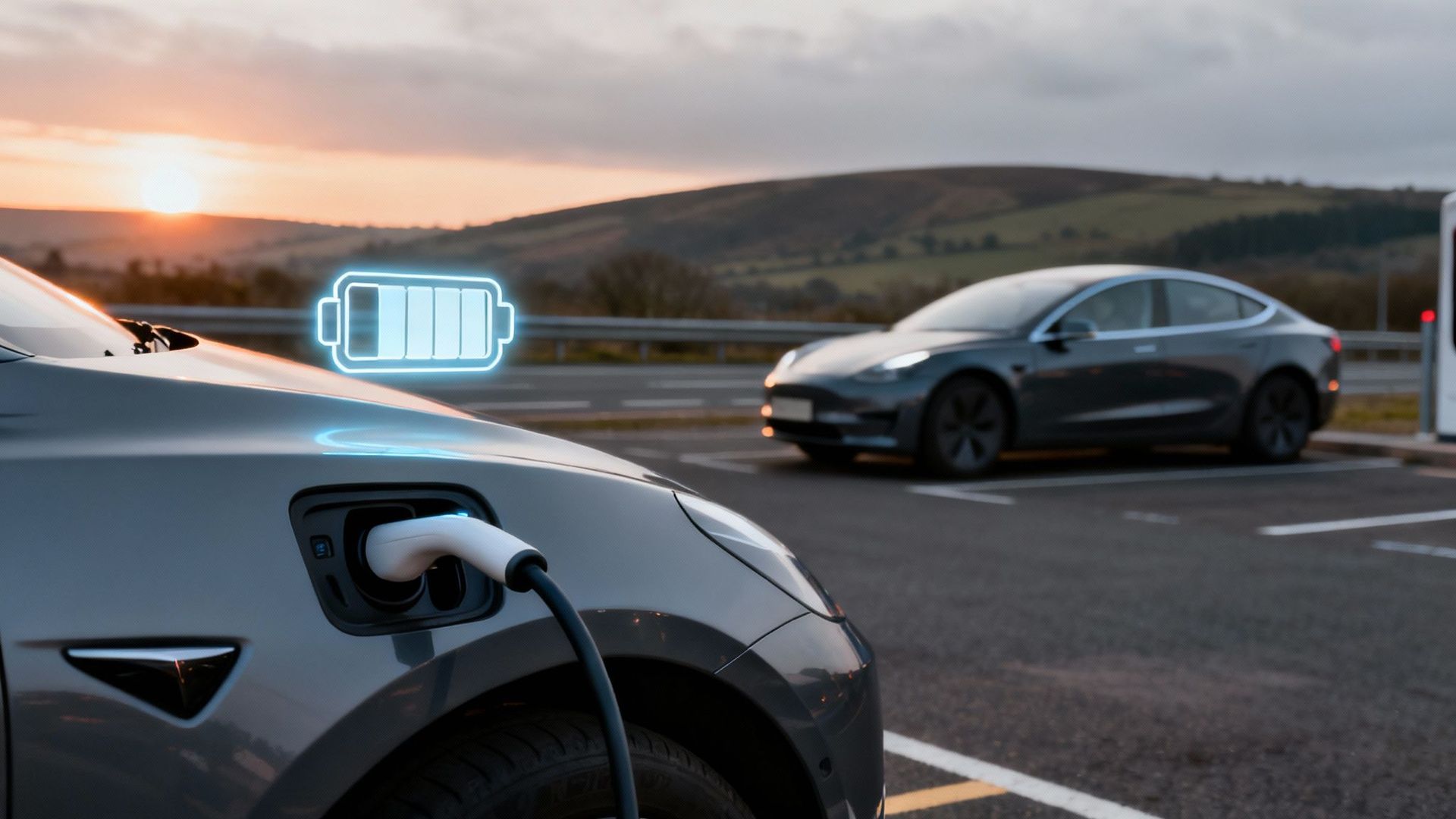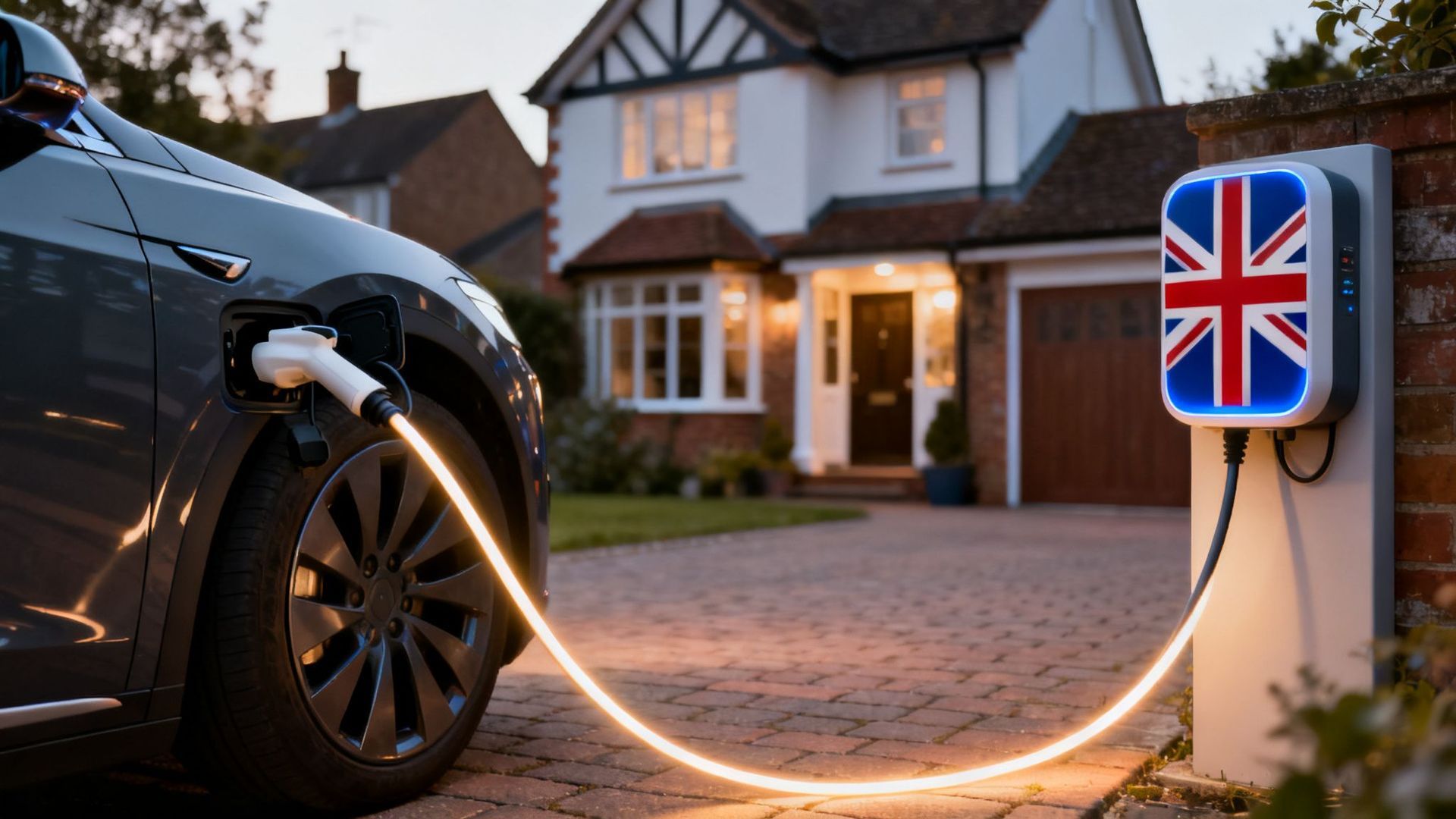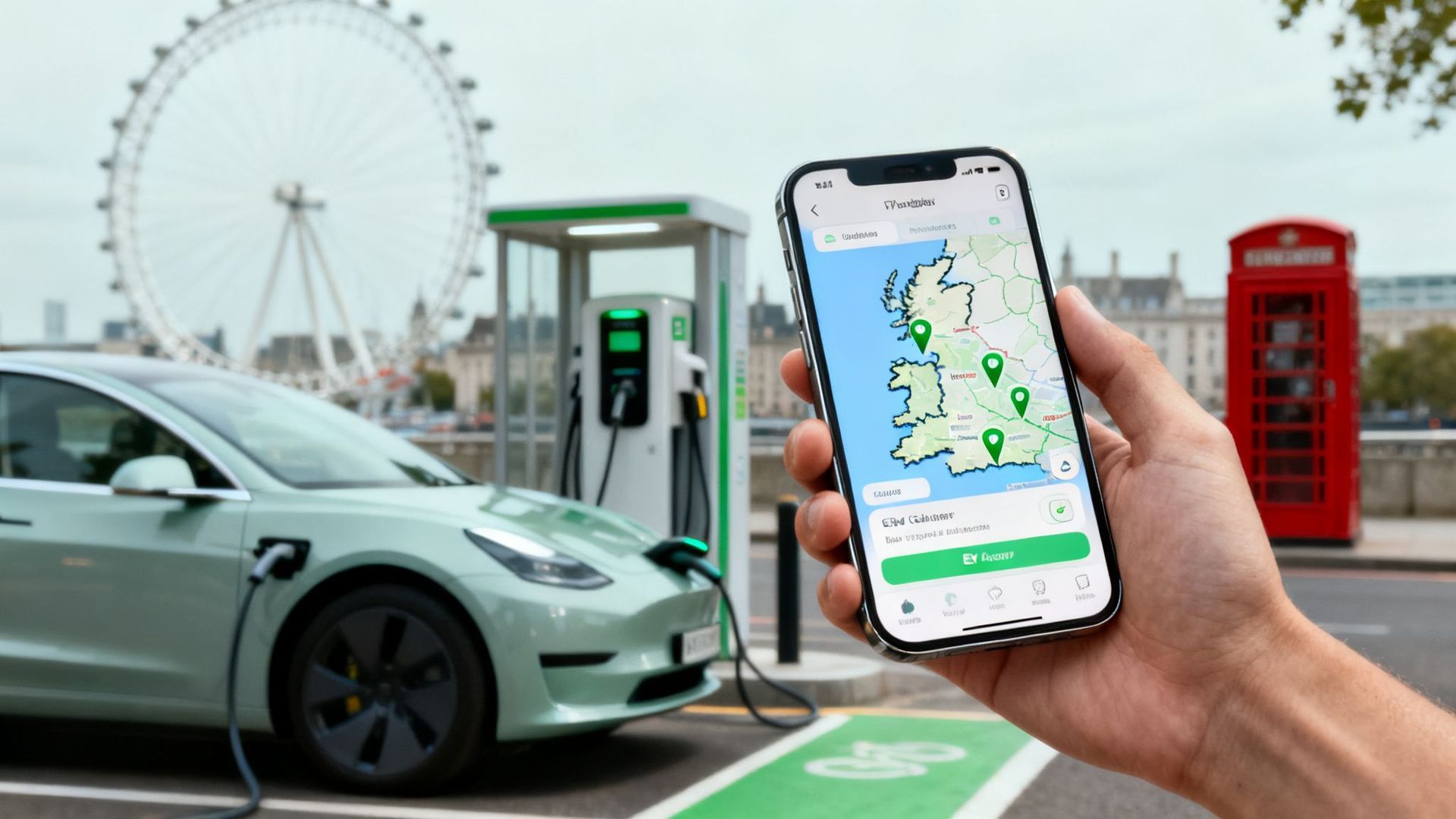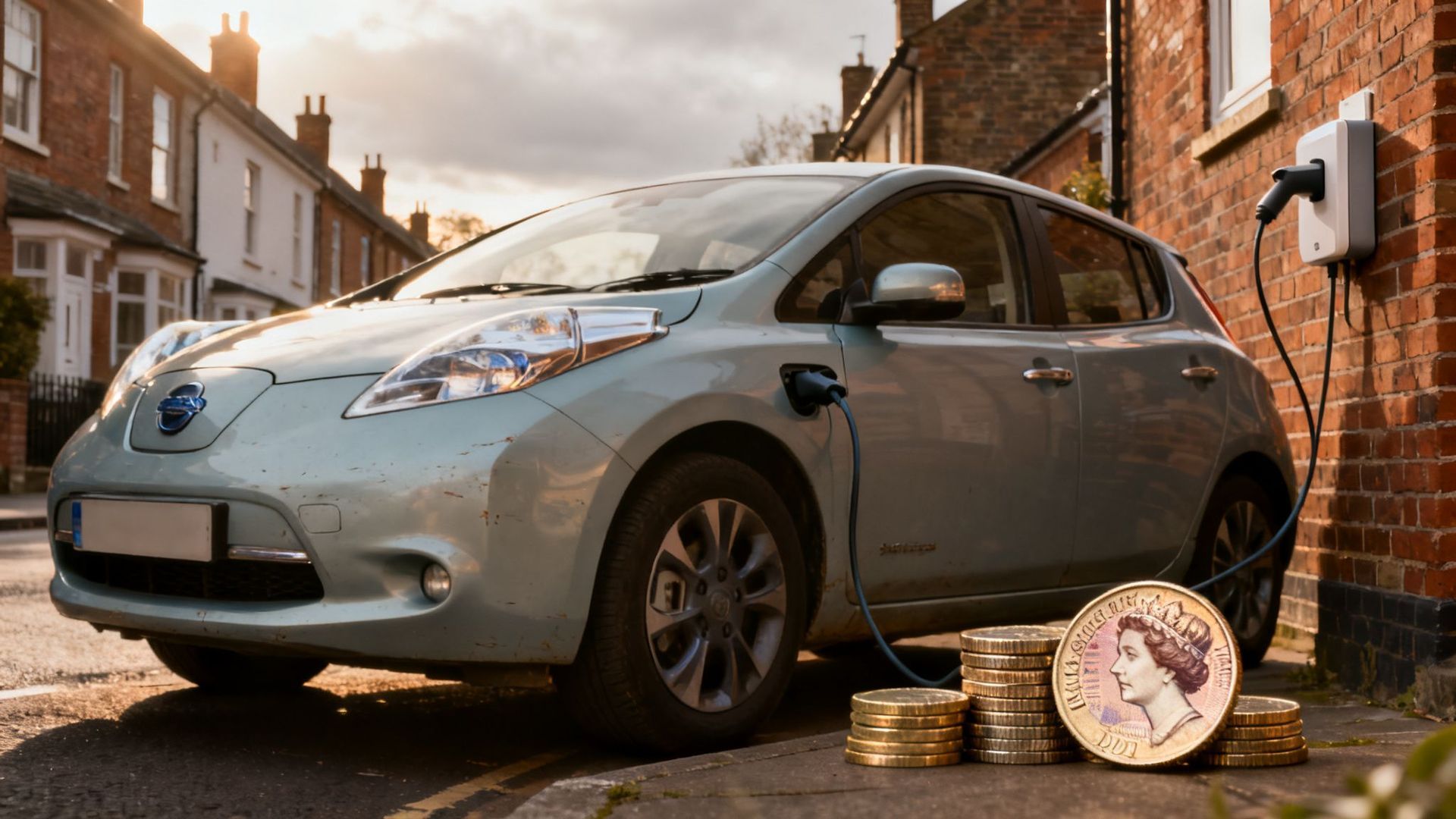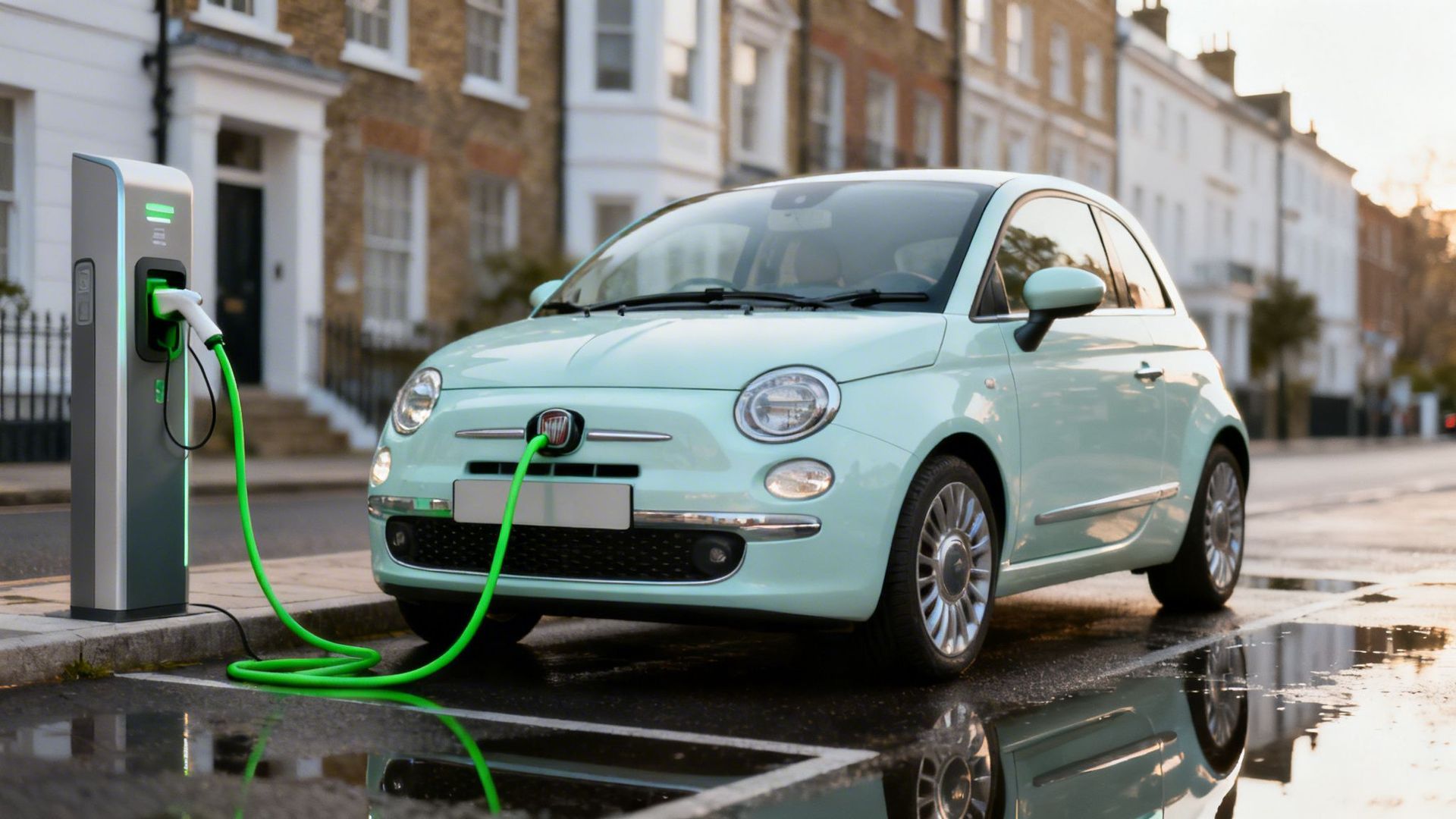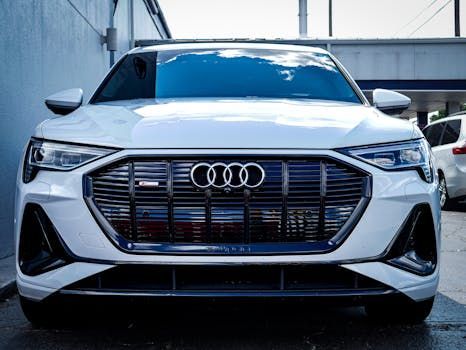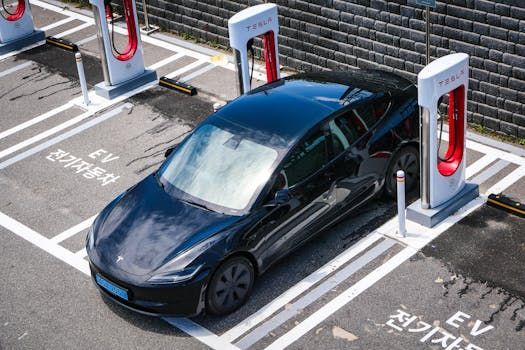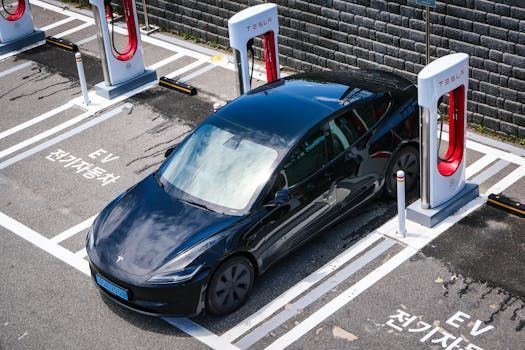Portable Car Chargers: The Ultimate UK Guide to Lugging Around a Power Brick
Let's be brutally honest, a portable car charger is a giant, ludicrously expensive power bank for your electric car. Think of it less as a nifty gadget and more like the EV equivalent of a space-saver spare tyre—a big, heavy lump you heave into the boot, praying you never actually have to use it. This isn't for your daily top-up; it's an emergency lifeline for when your range calculations go spectacularly, monumentally wrong.
The Modern Nightmare of a Flat EV Battery
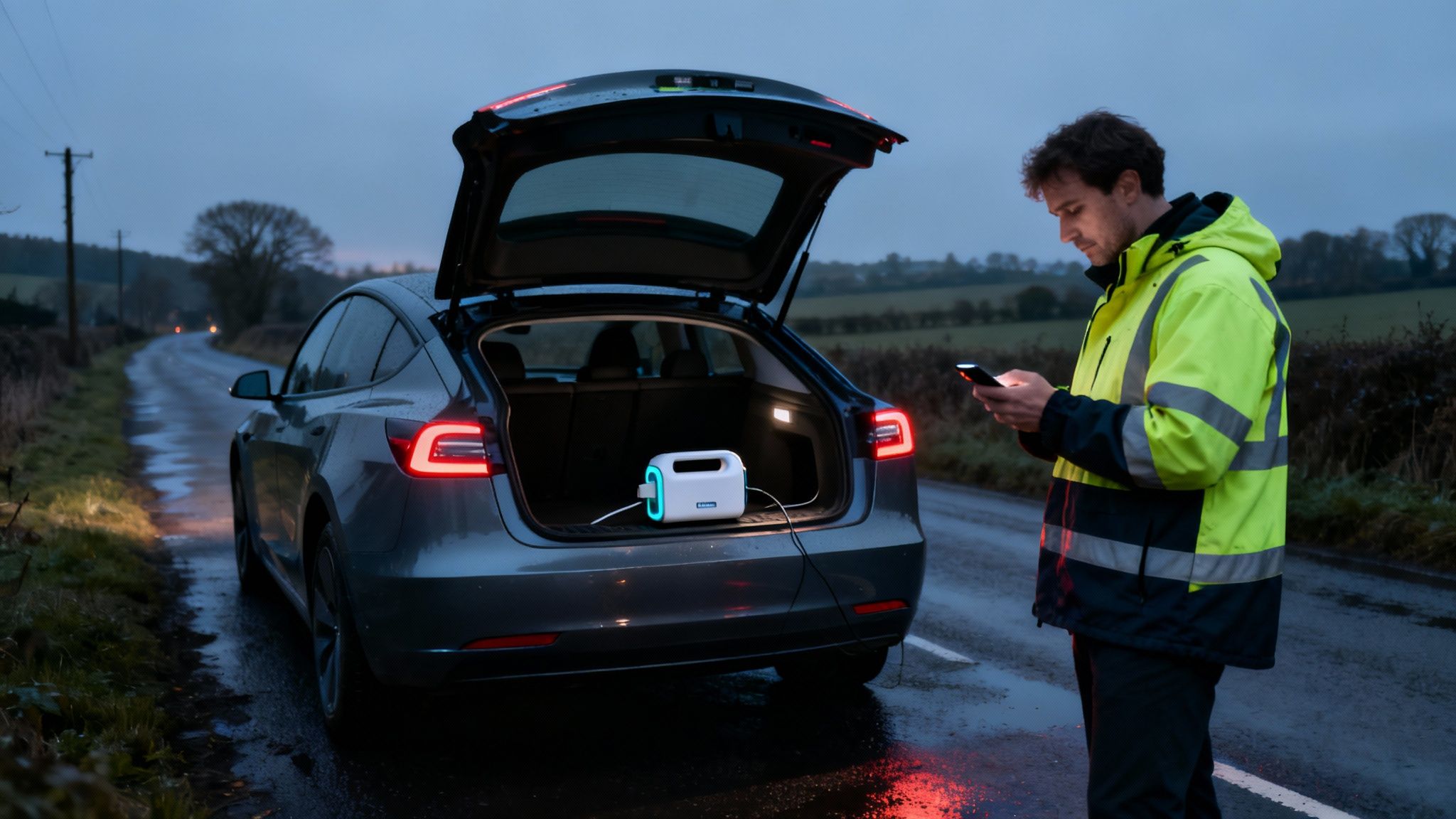
There’s a unique, stomach-churning dread that comes with being stranded on the hard shoulder of the M25 with a dead EV. The eerie silence, the pathetic rhythm of the hazard lights, and the slow, sinking realisation of the logistical omnishambles ahead—it’s enough to make any EV driver break out in a cold sweat. This is the very scenario that portable charger manufacturers build their entire marketing strategy around.
They paint a picture of total freedom, of wafting along the open road without a single care in the world. The reality? It’s a bit more complicated than that. These chargers are sold as the ultimate get-out-of-gaol-free card, but more often than not, they’re just incredibly heavy, expensive bricks that take up boot space and quietly mock your planning skills.
So, Who Actually Needs One of These Things?
For the vast majority of EV drivers who have a proper charger on their driveway, a portable unit is utterly redundant. The UK's public charging infrastructure, despite its occasional ability to induce rage, is growing so rapidly that getting caught short is becoming genuinely difficult. So, who are these devices really for?
- The Flat-Dweller: If you're stuck in a block of flats with zero chance of getting a dedicated charger installed, one of these could be a practical, albeit glacial, solution.
- The Chronically Anxious: For some drivers, range anxiety is a constant, nagging companion. If that's you, the peace of mind might justify the hefty price tag. That said, our guide on curing electric car range anxiety for good could be a more cost-effective first port of call.
- The Off-Grid Explorer: If your plans involve taking your EV to a remote corner of the Scottish Highlands, far from the nearest charge point, a portable charger could be your only ticket back to civilisation.
The real job of a portable car charger isn't to replace your regular charging habits. It's designed to deliver a slow, emergency trickle of power —just enough juice to get you out of a bind and crawl to the nearest proper charging station.
You can forget the marketing bumf showing people happily topping up their battery while having a scenic picnic. The reality is you'll be waiting an age to add just a handful of miles. This isn't a quick fix; it's a tool of last resort. Before you splash out a frankly silly amount of cash, you need to be crystal clear on what you're actually buying.
How Do These Gadgets Actually Work?
Right, let's get under the bonnet and see what makes these things tick. At its heart, a portable car charger is really just a massive, souped-up battery pack you can lug about. Think of it like the power bank you use for your phone, but one that’s been on a serious course of steroids and now weighs about the same as a small Labrador. It’s a beautifully simple idea in a reassuringly hefty package.
This isn’t some magic box that zaps your car back to a full charge in an instant. It’s much more of a slow and steady, watch-the-paint-dry kind of process. First, you charge the portable unit at home from a standard wall socket, letting it bank that energy until you find yourself in a tight spot. When your EV finally gives up the ghost, you simply connect this unit to your car's charging port, and it begins to transfer its stored power over.
What's Going On Inside?
So, what’s actually happening inside that heavy case? It’s not powered by some dark art, but by a few key components working together. Understanding them helps to make sense of both the weight and the painfully slow charging speed.
- The Battery Pack: This is the star of the show. It's essentially a cluster of high-density lithium-ion cells, the same technology found in your EV's main battery, just on a much smaller scale. This pack is what accounts for most of the weight and the eye-watering cost. A typical unit holds somewhere between 3kWh and 7kWh of energy, which is a drop in the ocean compared to the 60-100kWh battery in a modern electric car.
- The Inverter: Your home's electricity is alternating current (AC), but batteries—both in the charger and your car—store energy as direct current (DC). The inverter is the clever bit of kit that handles the conversion. It takes AC power from your wall to charge the unit's DC battery, and then manages the flow of DC power out to your car.
- Cables and Connectors: You can't miss them. These are thick, robust cables for a very good reason—they have to handle a lot of electrical current safely. In the UK, most portable car chargers will come with a Type 2 connector, which is the standard for the vast majority of EVs you see on the roads here.
It's crucial to see this for what it is: an emergency tool, not your day-to-day charging solution. Its job is to give you just enough extra range—think 20 to 30 miles after about an hour—to get you safely off the motorway and to a proper charging point. Trying to fully charge your car with one would literally take days, not hours. It’s the EV equivalent of a first-aid kit, not a trip to A&E.
Weighing the Pros, Cons, and Hefty Price Tag
Right then, let's get down to brass tacks. Are these chunky portable car chargers actually worth the staggering cost? On one hand, they dangle the promise of complete peace of mind, a magical get-out-of-gaol-free card for the dreaded flat battery. On the other, they are eye-wateringly expensive, weigh an absolute ton, and deliver a pitiful amount of range for the effort involved. It's a classic case of convenience versus cold, hard cash.
This isn't a simple purchase; it's a serious investment. While the global market for these devices is growing—projections suggest it could balloon to nearly USD 389 million by 2035 —the reality on UK roads is a bit different. Here, they remain a rare and costly sight. A decent unit will set you back anywhere from £2,000 to £5,000 . For that kind of money, you could install a top-of-the-line home charger and still have enough left for a rather nice holiday.
The Brutal Cost-Per-Mile
The real kicker isn't just the upfront cost; it's the shocking value for money when you break it down. When you compare the cost-per-mile from a portable charger against literally any other method, the numbers just don't add up. You're paying an enormous premium for a tiny amount of emergency range.
Let's put this into perspective. It’s time for a stark reality check.
Charging Reality Check: Portable vs. Fixed Chargers
The table below lays it all out. When you see the numbers side-by-side, it becomes painfully obvious where the smart money goes for day-to-day charging.
| Feature | Portable Charger | Home Charger (7kW) | Public Rapid Charger (50kW+) |
|---|---|---|---|
| Upfront Cost | £2,000 - £5,000+ | £800 - £1,200 | £0 |
| Convenience | Low - heavy, needs charging | High - plug in overnight | Medium - requires a stop |
| Charging Speed | Glacial (adds a few miles) | Excellent (full overnight) | Very Fast (80% in 30-40 mins) |
| Best For | Extreme emergencies only | Daily driving, cost-saving | Long journeys, quick top-ups |
As you can see, relying on a portable unit for anything other than a dire emergency is financial madness. Their true purpose is as an insurance policy, but it’s one with an exceptionally high premium. You could probably pay for an AA membership that includes EV recovery for the next century for the same price.
This simple diagram shows the core components you're paying thousands for: a battery, an inverter, and some chunky cables.
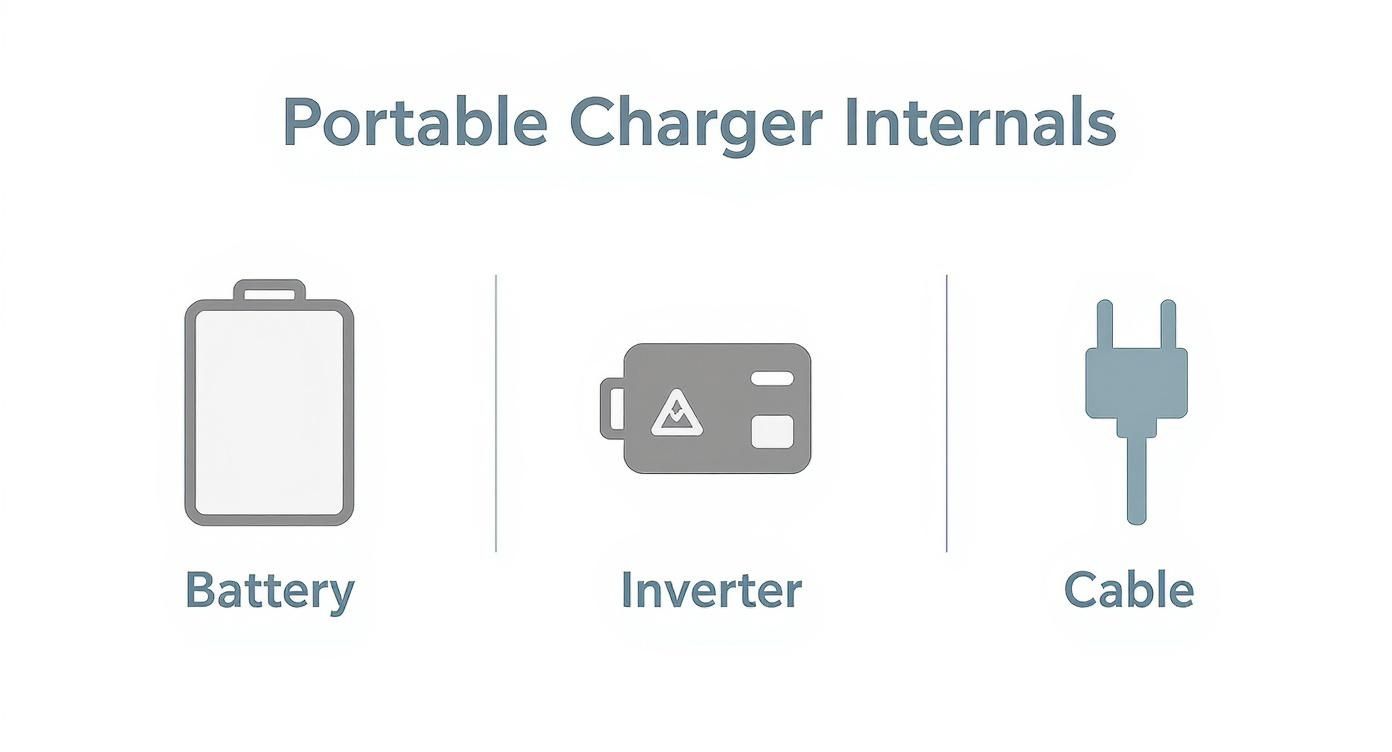
When you see it broken down like this, it highlights that you're essentially buying a small, inefficient, and monstrously overpriced version of what’s already built into the public charging network.
So, Is There Any Justification?
Who wins this cost-benefit analysis? For the average UK driver, the cons list is long and damning. The cost is prohibitive, the weight is impractical, and the performance is underwhelming. It’s a solution searching for a problem that, for most of us, doesn’t really exist.
The bottom line is this: unless you live in a remote Scottish bothy or have a very specific business need, your money is almost certainly better spent elsewhere.
Investing in one of the best home EV chargers UK drivers recommend will give you far more bang for your buck, transforming your daily driving experience in a way a portable brick simply cannot. The tiny sliver of peace of mind a portable unit offers just doesn't stack up against the mountain of drawbacks.
Having a Gander at the UK's Public Charging Network
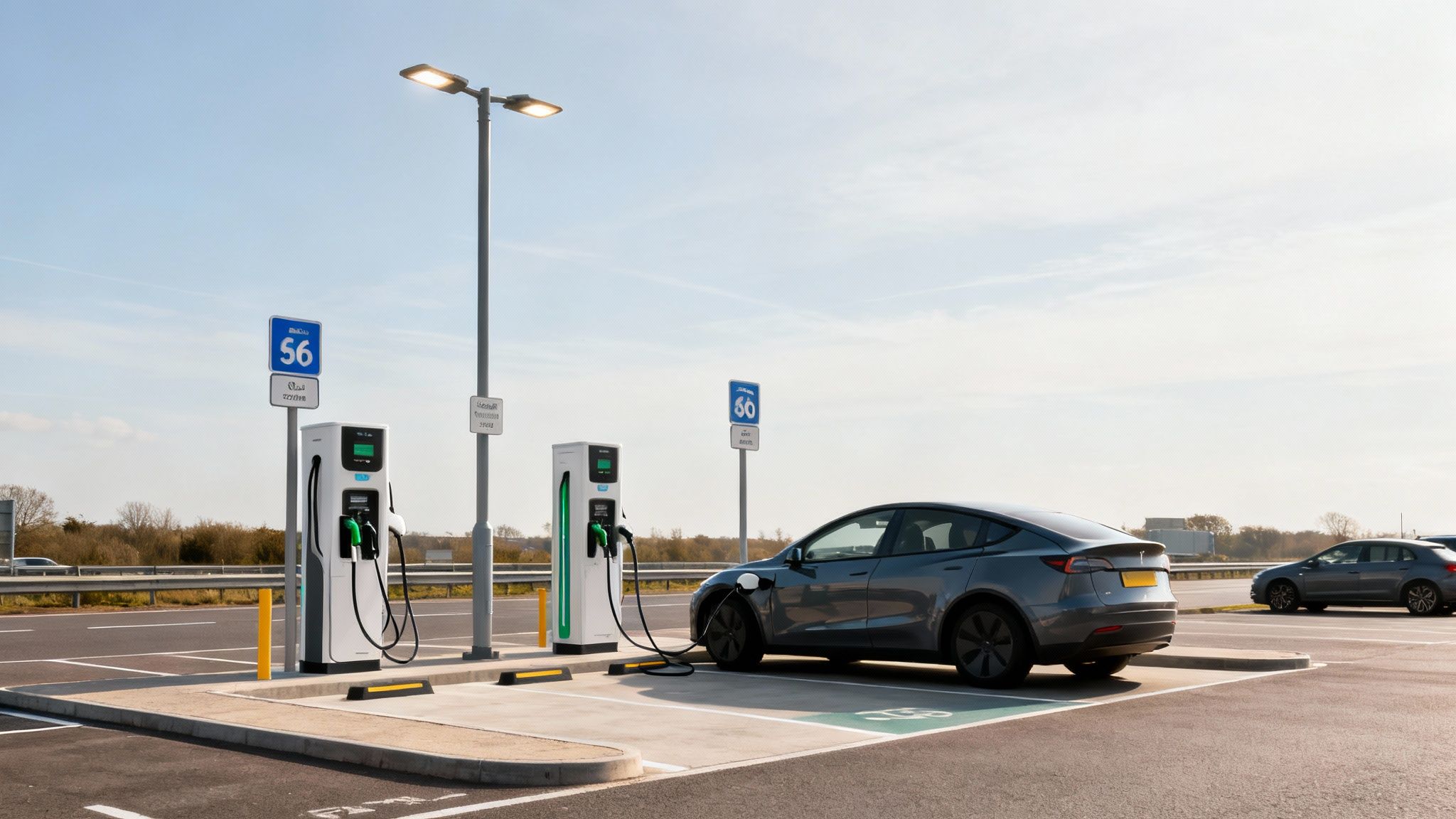
Before you start seriously considering a portable charger—and the crippling price tag that comes with it—let's explore the alternative: the UK's ever-growing, and sometimes wonderfully chaotic, public charging network.
Honestly, the sheer number of plugs, posts, and superchargers popping up across the country makes the idea of lugging your own charger around seem a bit daft. For the vast majority of EV drivers, sticking with the public network is cheaper, much faster, and just plain more sensible.
The network isn't a one-size-fits-all solution, though. It’s more of a tiered system, with speeds ranging from a gentle trickle to a full-on torrent of power. Think of it like filling a paddling pool – you could use a dripping tap or a fire hose. Both will get the job done, but one is clearly the winner when you're short on time.
The Slow, The Fast, and The Blisteringly Quick
Getting your head around the different charging speeds is the key to understanding why a portable charger probably isn't the answer to your prayers. Each type has its place, and knowing the difference will save you a world of frustration.
-
Slow Chargers (3-6kW): You'll often spot these disguised as lampposts or bolted to walls in car parks. They're the tortoises in this race. Perfect for an overnight top-up if you're staying at a hotel, but pretty much useless if you need a quick boost.
-
Fast Chargers (7-22kW): These are the real workhorses of the network. They're common at supermarkets, gyms, and public car parks, and they'll give you a decent top-up in the couple of hours it takes to do the weekly shop or have a go on the treadmill.
-
Rapid & Ultra-Rapid Chargers (50kW+): Now we're talking. These are the big guns, usually found at motorway services. These powerhouses can get your battery from 20% to 80% in the time it takes to grab a disappointing service station coffee. For long journeys, these are an absolute game-changer.
With every new public charge point that gets installed, the case for owning a portable charger gets a little weaker. The network is growing at a phenomenal rate, turning the UK from a 'charging desert' into a landscape dotted with convenient places to plug in.
The Network is Growing, and Fast
This isn't just hype; the numbers are genuinely staggering. By January 2025, the UK was home to 73,334 public charging devices . That’s a massive 37% increase in just one year.
What's really important is that 20% of these are the super-powerful 50kW+ rapid chargers—the exact type that makes long-distance EV travel a total breeze. If you're curious, you can explore the government's latest charging statistics to see the full picture.
This explosion in growth means the odds of getting stranded with a flat battery are getting slimmer by the day. So, instead of splashing out on a portable unit, a much smarter move is to simply get to know the network around you. A great place to start is to find EV charging stations near you with top UK apps, which can turn a potential headache into a simple pit stop. The infrastructure is there—it’s just a matter of using it.
What's Next for On-The-Go EV Charging?
Let's gaze into the crystal ball at the future of charging your car away from home. Like any emerging tech, it’s a mix of genuinely useful innovations and a bit of marketing fluff designed to shift more units. While portable car chargers currently feel like a handy backup, the technology fuelling them is getting a lot cleverer, even if their core purpose remains a bit of a head-scratcher for most drivers.
The industry loves a buzzword, and you'll hear a lot about ‘plug-and-charge’ and ‘smart load balancing’. In simple terms, this is all about making the charging process less of a faff. The idea is that your car will just 'talk' to the charger, automatically sorting out the billing and power delivery without you needing to wrestle with apps or payment cards. It’s a great concept, but is it enough to justify stashing a pricey portable unit in your boot?
These changes are being driven by new regulations. From 2025 , any new portable chargers sold in the UK must follow stricter rules like ISO 15118 – that's the standard that makes all this smart communication possible. It's a big step forward for safety and user experience, and you can get a better sense of how these upcoming regulations will impact the UK market.
Your Car and the Smart Grid
The bigger picture here is that your car is slowly becoming just another smart device connected to the national grid. ‘Smart load balancing’ is really just a fancy way of saying we need to stop the grid from keeling over when everyone plugs in their EV after EastEnders. A smart charger, whether it's fixed to your wall or, in theory, rolling around in your boot, can be programmed to top up only during off-peak hours when electricity is cheap and abundant.
This is where the V2G (Vehicle-to-Grid) concept gets really interesting:
- Grid Support: Imagine your car selling a bit of power back to the grid during peak times, earning you a few quid while you're at work.
- Energy Efficiency: It helps the grid make better use of renewables by storing excess solar or wind power that would otherwise go to waste.
- Lower Bills: By charging only when it’s cheapest, you can seriously cut your running costs.
The real irony here is that as our cars and the public charging network get smarter, the whole argument for lugging a giant, separate battery around becomes weaker. A truly intelligent, connected system should make getting stranded almost impossible.
Are Portable Chargers Heading for Extinction?
When you put it all together, the future points towards a world where portable car chargers are a solution to a problem that might not exist for much longer. The relentless expansion of ultra-rapid public chargers, coupled with cars that can intelligently manage their own power, is paving the way for a seamless charging experience.
Your car will know its battery level, find the nearest available charger, and guide you there long before you even think about running out of juice. So, while the tech inside portable chargers will no doubt improve, their actual relevance is likely to shrink. They'll probably be relegated to an even smaller niche, perhaps for serious off-gridders or specialist use cases. For the rest of us, the future is about trusting the network, not carrying a backup plan.
Our Verdict: Should You Actually Buy One?
Right, let's cut to the chase. After all the technical talk and number crunching, the big question is still hanging in the air: should you really splash out on one of these hefty gadgets?
For the vast majority of UK drivers, the short and honest answer is almost certainly no. A portable car charger is an expensive, comically heavy, and frankly, unnecessary solution to a problem that’s quickly fading in the rear-view mirror.
The simple truth is the UK's public charging network is growing at a phenomenal rate. While range anxiety was a legitimate worry a few years back, it's now more of a ghost story drivers tell each other than a genuine daily threat. Buying one of these devices to "fix" it is a bit like carrying a fire extinguisher everywhere just in case you spontaneously combust. It’s an extreme solution for a worst-case scenario that's becoming less likely by the day.
The Tiny Niche It Might Actually Suit
So, does that mean they're completely useless? Not quite. There's a very small, very specific group of people who might find a portable charger genuinely useful. If you see yourself in the descriptions below, then maybe—just maybe—it’s worth considering.
-
The True Off-Grid Adventurer: If you're the type to take your electric campervan into the wilds of the Cairngorms, miles from any hint of civilisation, then a portable unit could be a lifesaver. It becomes less of a gadget and more of a vital piece of expedition kit.
-
The Rural Fleet Manager: Imagine you're running a business with a fleet of electric vans in a remote corner of the countryside. In that specific context, having a mobile charging unit on hand for emergencies could be a very sensible operational investment.
For everyone else—the daily commuters, the weekend road-trippers, the family taxi drivers—our advice is simple: save your money. Get a good charging app on your phone, learn to enjoy a twenty-minute coffee break at a service station, and put the thousands of pounds you’ve saved towards something far more rewarding. Like a really, really nice holiday.
Got Questions? We've Got Answers
Still got a few things you're wondering about? Let's tackle them head-on. Here’s a quick-fire round of straight-up answers to settle any lingering doubts you might have about portable car chargers .
How Much Range Can I Realistically Expect?
Think of it as a splash of fuel, not a full tank. Most of these units will give you somewhere between 20-40 miles of range after about an hour of charging.
It’s really just a ‘get out of gaol free’ card designed to get you to the nearest proper charging station, not a replacement for one. Don't expect to go from empty to full unless you fancy camping overnight next to your car.
Are They Legal to Use Anywhere in the UK?
This is a crucial point. Generally, yes, but only on private property where you have the owner's permission.
What you absolutely cannot do is trail a cable across a public pavement from your flat to your car. It’s a major trip hazard and a surefire way to get on the wrong side of your neighbours and the local council. They're best kept for genuine emergencies or specific situations like campsites where you won't endanger anyone.
In short, the use case is incredibly specific. See it less as a daily charging tool and more as a private, last-ditch option for when you're truly stuck.
Is Using One Cheaper Than Public Charging?
Not a chance. In fact, it's financial madness to even draw a comparison.
The upfront cost is huge, often running into thousands of pounds. When you add the cost of charging the unit itself from the mains, the price per mile it adds to your car is miles higher than even the most expensive ultra-rapid public chargers. This is purely a distress purchase, not a savvy economic move.
At VoltsMonster , we cut through the noise to give you the real story on all things EV. For more honest takes and reviews, check out our latest content.

